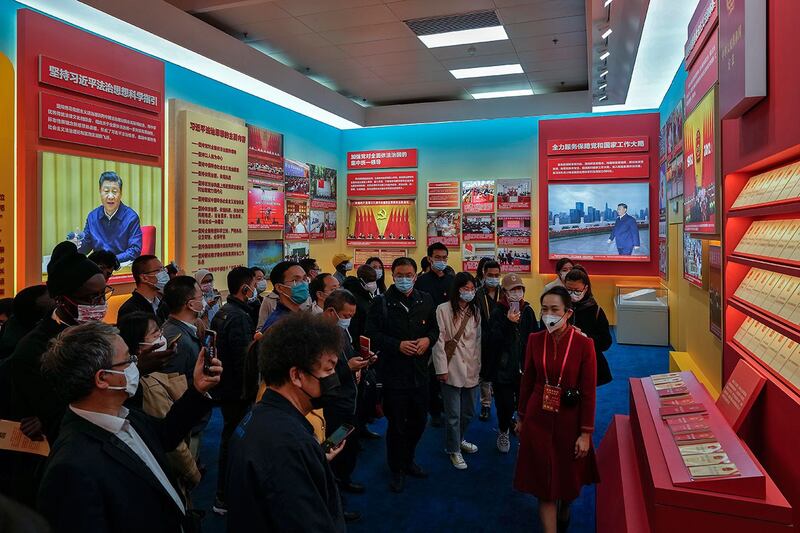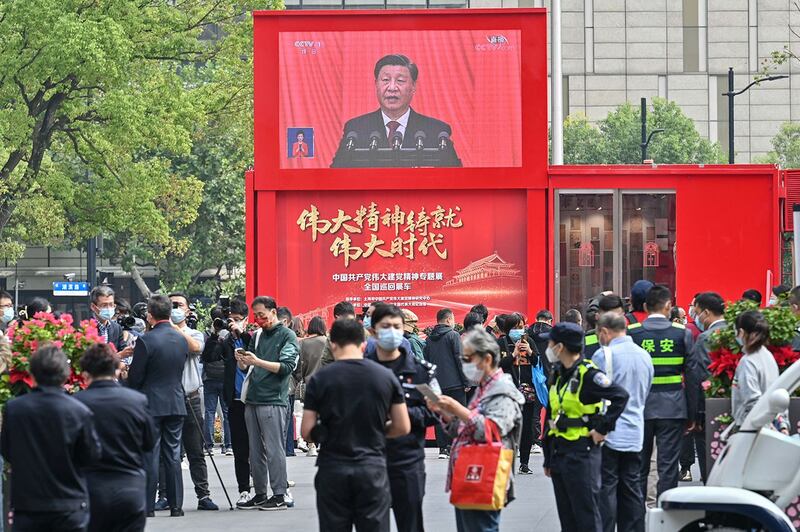At the ruling Chinese Communist Party's (CCP) 20th National Congress, which runs in Beijing from Oct. 16-22, its leader Xi Jinping is widely expected to be endorsed for an unprecedented third term in office, after amending the constitution to abolish presidential term limits in 2018.
The move comes amid growing concerns over a Mao Zedong-style personality cult around Xi, as institutions and political figures compete to show the utmost loyalty to Xi and his personal brand of political ideology.
Personal political ideologies -- the best-known of these is likely Mao Zedong Thought, as immortalized in the Little Red Book -- are used to consolidate power around Chinese leaders, and to ensure their place in the annals of party history since the founding of the People's Republic of China in 1949, as they are named alongside foundational communist theorists Marx, Engels, Lenin and Stalin.
Each leader has brought with them a new set of political buzzwords, which function as a way for supporters to show political loyalty and unity, rather than as practical instructions for running the country. These come later, in the form of laws, rules, guidelines and directives from the Central Committee and the National People's Congress.
Here is a breakdown of some of the key phrases linked to Xi's political ascendancy -- some of which are new, and some repurposed:
Xi Jinping thought in the new era of socialism with Chinese characteristics
Xi's personal brand of political ideology, which functions more as a way of asserting his personal power than bringing new political ideas to the table. Endorsed in November 2021 by a CCP resolution on party history, only the third in its century-long history, supporting "core leader" Xi Jinping to take China into a new era of international assertiveness and long-term Marxist rule.
The people's leader
A description of Xi Jinping increasingly used by state media since 2019 to boost the image of the CCP general secretary as a lovable man of the people, and to amplify his claim that it was the Chinese people who put him in the top job. Late supreme leader Mao Zedong is the only other Chinese leader to have this epithet applied to him.
Xi's adoption of the term is indicative of a growing personality cult around him, according to political analysts and critics within his own party.
Regulating the wealth accumulation system
A promise from Xi to stop some people from getting too rich, too quickly. The concept coincides with a crackdown and curbs on the power of "red capitalists" in recent years, particularly on privately owned tech giants like Alibaba, ByteDance and ride-hailing app Didi in recent years.
It also includes promises to make changes to the taxation and social security systems.
Liu Mung-chun, head of mainland China research at Taiwan's Chung-Hua Institute for Economic Research, said Xi Jinping views the "real economy" of labor and industry as more important than the digital economy, which he sees as a form of "opiate" for the masses.
Xi doesn't see mobile and computer gaming, and the entertainment industry in general, as a legitimate form of economic activity, and is promising to reform the education system, medical care and real estate sectors to improve the lives of ordinary people, Liu told RFA.
"It's actually about the pressures faced by ordinary people ... and also about Xi Jinping's ideas about economic value," he said. "He is a Marxist who believes that people who make money through labor should be respected."

Whole-process democracy
The claim that there exists under CCP rule a form of consultative, and therefore democratic, process with input from stakeholders and citizens.
Generally used to support Beijing's view that the Chinese system is more efficient, and can deliver better results, than Western-style democracy, particularly when it comes to mass mobilization like that seen in China's response to the COVID-19 pandemic.
Foreign minister Wang Wenbin once remarked that democracy isn't like Coca-Cola, the same flavor wherever in the world you drink it.
Deng Yuwen, a former newspaper editor for a CCP party school publication, said Xi wants to show the world that Western-style democracy isn't the only path to modernization.
Chinese-style modernization
Analysts told RFA that this is much like modernization anywhere, but specifically tailored to China's situation.
It is likely linked to the pivot under Xi away from an export-led economy that was the "workshop of the world," and towards a state-dominated domestic economy, particularly in the face of U.S. tech export bans and economic sanctions.
"This so-called 'Chinese-style modernization' is a new term, repackaged to provide ideological legitimacy for [Xi's] ongoing rule or governance," Deng Yuwen said. "Repackaging makes it seem new, and gives it a new role in the ideology."
American hegemony
A common epithet applied to U.S. military power and influence around the world that was widely used in the Mao era, falling out of fashion under the economic reforms and opening up initiated by late supreme leader Deng Xiaoping in 1979.
The term is now making a comeback in the wake of a trade war with the U.S. and a toughening of China policy under the Trump and Biden administrations, amid growing tensions over democratic Taiwan, and following the Russian invasion of Ukraine.
National rejuvenation
Xi's concept of "national rejuvenation" positions him as standing up to foreign oppression on behalf of China's 1.4 billion people.
It is a long-term project under which China takes its rightful place as a major world power and exports its model of authoritarian rule to other countries.
It forms part of the rationale for Xi to remain at the helm for longer than the two five-year terms previously allowed under the constitution.
Party leadership
The idea that the party, rather than the government, civil society or companies, should run the country right down to the household level, with total party control over industry, agriculture, commerce, education, the military and government.
Under Xi, this has also led to the setting up of CCP committees in major companies, including foreign enterprises, tight media controls and censorship, and the widespread study of Xi Jinping Thought in universities and mass surveillance of ordinary citizens.

The great struggle
The huge amount of work needed to achieve national rejuvenation and party leadership, as defined by Xi's ideology. Contains echoes of the political "struggle sessions" of the Cultural Revolution (1966-1976).
U.S.-based veteran democracy activist Wang Juntao said many of the terms presented at the party congress are simply "containers," or code, for Xi's supreme leadership over party and country.
"They're using a new set of vocabulary, but it's still all about that power relationship," Wang told RFA. "[It's still about Xi] having the final say over the affairs of 1.4 billion people ... and about the use of violence to force them to obey."
"The great struggle and party leadership are just containers [for that principle]."
Red country
According Xi Jinping, the country is the people and the people are the country. According to Baidupedia, the "red country" concept denotes ideological unity, of the kind that will likely be needed for the "great struggle" to be a success. The need to achieve ideological unity can also give rise to class struggle, the entry says, adding that the color red also carries connotations of the joy and happiness felt by workers and farmers after overturning their oppressors. The idea also appears to echo the lyrics of revolutionary anthems from the Mao era, like "Chairman Mao is the red sun in all of our hearts."
Since Xi took power, millions of people have been playing a game testing their knowledge of Xi Jinping Thought via a mobile phone app, which has also been adapted for use in private cars. Analysts say the Xuexi Qiangguo app is a modern-day equivalent of the once-ubiquitous "Little Red Book" of sayings attributed to Mao.
Translated and edited by Luisetta Mudie.
